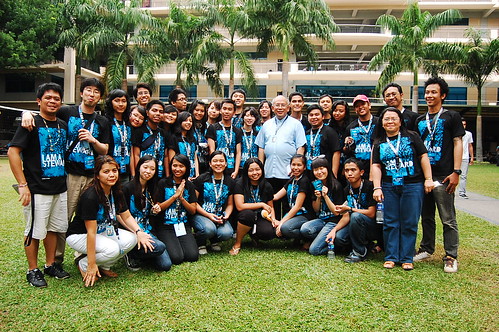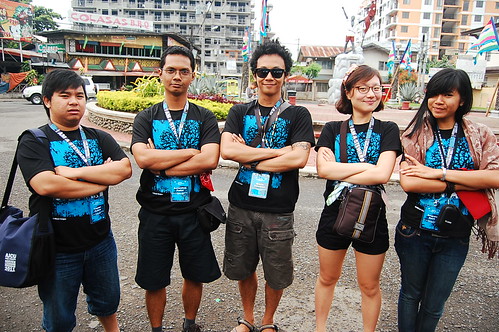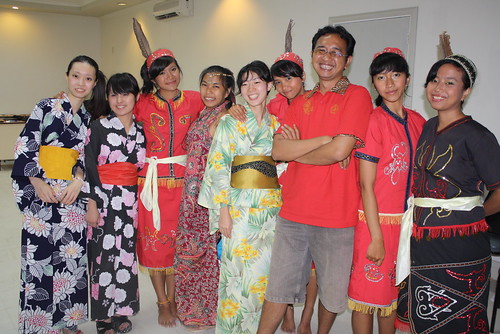
AJCU Participants with Fr. Joel Tabora, S.J., AdDU President
The Ateneo de Davao University hosted the 4th Service Learning Program (SLP) of the Association of Jesuit Colleges and Universities in Asia Pacific (AJCU-AP) on August 7-27, 2011, participated in by students and mentors coming from the network of Jesuit institutions in the Asia Pacific region. A total of thirty two (32) participants from the Ateneo de Davao University, Xavier University (Ateneo de Cagayan), Ateneo de Zamboanga University and Ateneo de Naga University in the Philippines, and from Universitas Sanata Dharma of Jogjakarta in Indonesia, the Elizabeth University of Music of Hiroshima in Japan, and Sogang University of Seoul in South Korea, gathered for a three-week interactive activities which exposed them into contemporary socio-cultural issues amidst environmental challenges of Davao through a series of fora, workshops, cultural encounters, exposures, immersion, community service and reflection sessions.
This year’s SLP is the fourth in a series of experiential learning through meaningful community service. This has been previously hosted by Xavier University, Universitas Sanata Dharma, and Sophia University in Japan, within the last three years. It is a program that specifically highlights participative learning of the richness of the local community’s cultural milieu, understanding the contemporary challenges facing its traditions, with the primary intent of instilling among the participants the value of service and solidarity through a common project that express their concrete response to the entire learning process.

Asian students in Davao City
SLP 2011, managed by the Social Involvement Coordinating Office (SICO), the social formation arm of the Ateneo de Davao University, focused on the theme Education for Environmental Stewardship: A Model Towards Reconciliation with Creation, cited as one of the important frontier agenda of the recent General Congregation of the Society of Jesus. Working on the framework from ridge to reef (from mountain to sea), the participants commenced the three-week program with an orientation at Eden in Bayabas, Toril, and concluded with a reflection phase and cultural presentation at the Island Garden City of Samal.
Central to this year’s SLP is the Indigenous Peoples. The program was crafted into two phases. The first phase highlighted the sub-theme of the indigenous peoples (IPs) and their valuing of the land and environment. Participants had an orientation at the multi-awarded Pamulaan Center for IP Education in Mintal, Davao City on IP culture, traditions, current realities and challenges, and community vision. This was followed by a cultural bonding with and among scholars representing IP ethnic groups of the Philippines. This was capped by a visit to a model IP managed community school in Sitio Kontrak in Barangay Salumay, Marilog District. To give a deeper understanding on the IP’s involvement in land deals and agro investments, as a primary stakeholder, the Alternative Forum for Research in Mindanao (AFRIM) presented the result of some studies in this venture. The participants were also exposed to the reality of IP’s involvement with water-power infrastructure through a visit to Hedcor, Inc. power plants in Sibulan, Sta. Cruz and at Sitio Tudaya in Barangay Kapatagan, Davao del Sur. The participants were given the opportunity to dialogue with two major group of stakeholders in this venture: the Tribal Council of Sibulan, facilitated by their Chieftain, Datu Giddeon Tolentino and the Hedcor, Inc. headed by their President and Chief Operations Office, Mr. Rene Ronquillo.

Participants in their national costume during cultural night.
The second phase focused on the sub-theme environment conservation, adaptation and restoration, where participants were oriented on biodiversity and sustainable forests and conservation programs of the Philippine Eagle Foundation, a private, non-stock, non-profit organization dedicated to saving the endangered Philippine Eagle and its rainforest habitat. This was followed by a workshop at the Philippine Eagle Center Education Program, and an education session on Philippine Eagle conservation, in Malagos, Baguio District, Davao City. The venue shifted to Ateneo de Davao University College Campus with fora on mining — one focused on the presentation of the mining research jointly conducted by the three Ateneo universities in Mindanao; and another on the effects of mining in key biodiversity areas, given by environmental advocate Ms. Gina Lopez, Managing Director of the ABS-CBN Foundation.
Incidentally, one of the highlights of the program was an opportunity for the participants to experience Davao in the midst of its annual celebration of the Kadayawan Festival, a celebration of and thanksgiving for life, bounty of nature and wealth of culture. This occasion fits in so well into one of the main thrusts of the program on cultural exchange.
The service learning program culminated with a live-in immersion at a Gawad Kalinga (GK) Pueblo Antonio Village, Barangay Catigan in Toril. The participants were housed in foster homes, and were oriented on watershed conservation, natural farming, farm re-plotting, farm work, vegetable and tree planting. The four-day immersion gave the participants a direct hand in experiencing natural farming and tree planting yet more importantly, share in the lives of a typical suburban Filipino GK family.
This year’s program prides its success through the support of AJCU-AP Chair, and newly installed President of Ateneo de Davao University, Fr. Joel E. Tabora, SJ, the university community, and SICO, the managing office, through Ms. Lilibeth Leh-Arcena, this year’s SLP program manager. In particular, the program credits its successful ran through close coordination with several partner institutions, whose collaboration in the conduct of the various activities stretched in twenty-one (21) days contributed to achieving its goal and objective. (By M. Isabel S. Actub, SICO)
